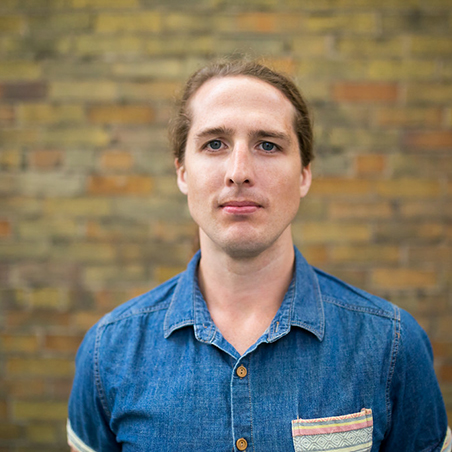David Huebert
Writer of Fiction & Poems
Bachelor of Arts (Hons.), Contemporary Studies and English, 2008
My process is always a feedback loop of conversation and writing.
David Huebert grew up in Halifax. After years away, he has returned as an author, educator, and critic.
“It feels like a bit of an odyssey,” he laughs. After graduating from King’s, David went on to get his Masters at the University of Victoria, followed by his PhD at Western University, alongside publishing a handful of books. “As my partner likes to say: ‘ten years, three books, two kids, three degrees.’”
David’s interest in academic and writerly pursuits can be traced to the year he spent as, of all things, a dishwasher. It was the year after high school and David wasn’t sure what he wanted to do. He happened to go to a lecture on political philosopher Thomas Hobbes by King’s professor Simon Kow. The lecture he recalls made the subject matter “engaging and full of life”. And David was hooked.
“I liked the idea of sitting in Alumni Hall and going through these great texts. It seemed like a great place to learn.”
Now, David finds himself returning to Alumni Hall, this time as an instructor. From Fall 2020, he joins King’s as a Faculty Fellow of the Humanities.
“FYP was a real point of germination for me — my tutors really made an impact on me. I honour that in so many ways and I’m pleased to be able to convey some of that to my students.”
David had honed his ability for academic writing in his undergrad, but it was only during his Master’s degree at University of Victoria that he began to seriously write poetry and fiction.
“I saw a poster for a poetry contest. I thought, ‘Hey I could do that.’ Then that poem won in the emerging poet category. It gave me permission to keep writing.”
And he has. He has won awards, published in journals, and in 2015 published his first book of poetry We Are No Longer The Smart Kids In Class (Guernica Editions). More recently, he has published a collection of short fiction, Peninsula Sinking (2017).
David finds energy and inspiration in his work life of teaching, writing, and discussing ideas — each aspect supporting the other. “My process is always a feedback loop of conversation and writing,” he says. “I always thrived in the classroom and am energized by conversation, which is something we learned in FYP.”
It was while studying Contemporary Studies and English at King’s that David found his interest in the relationship between human and animal subjects, an idea which he continued to pursue in his master’s degree and his PhD.
David Huebert’s upcoming publications delve into issues of environmental precarity and the human and non-human actors tangled up in it. Chemical Valley, a collection of stories, is a portrait of the effect of the oil industry community of Lambton county, outside of London, Ontario, where David lived while completing his PhD. His book of poetry, Humanimus, meditates on questions of interspecies connection.
David asserts that discussions about ecology are inseparable from every other aspect of life. “It’s partly just how we frame our thinking,” he says. “Everyone is basically thinking about ecology whether we know it or not: being social is a form of being ecological.”
Updated: Sept. 2020
 Connect with David Huebert
Connect with David Huebert